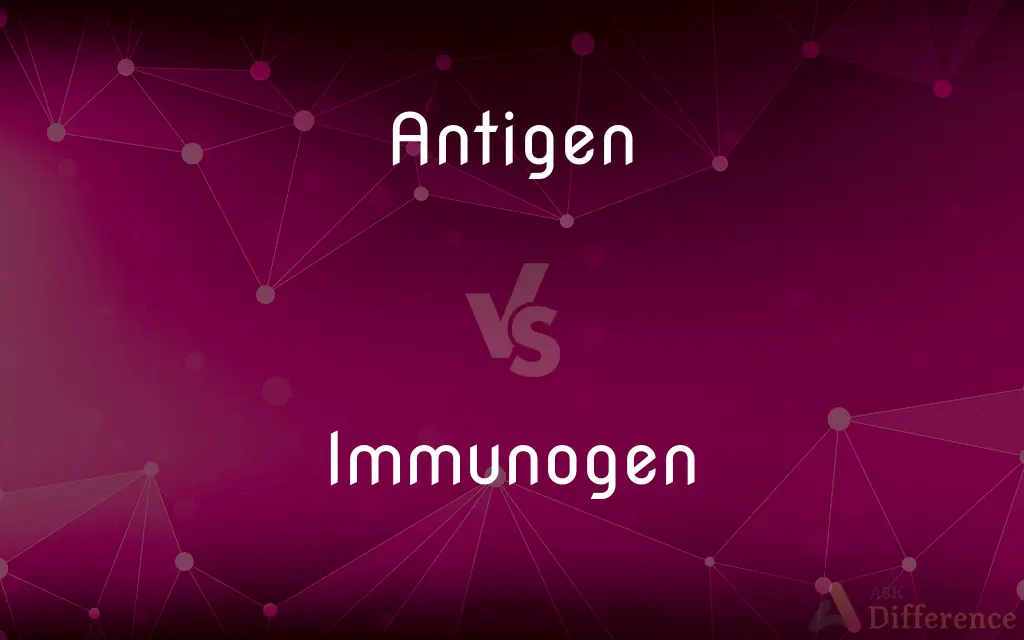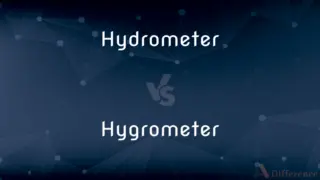Antigen vs. Immunogen — What's the Difference?
Edited by Tayyaba Rehman — By Urooj Arif — Updated on April 14, 2024
Antigens are substances that bind to specific immune receptors, whereas immunogens are capable of eliciting an immune response.

Difference Between Antigen and Immunogen
Table of Contents
ADVERTISEMENT
Key Differences
Antigens are molecular structures recognized by the immune system, often as part of a pathogen such as a virus or bacterium. On the other hand, immunogens not only get recognized but also trigger a full immune response, leading to the production of antibodies or the activation of immune cells.
While any molecule can theoretically be an antigen if it binds to an antibody or a receptor, not all antigens are immunogens. Immunogens, however, must possess certain properties, such as a degree of foreignness, size, and complexity, to effectively stimulate the immune system.
Antigens include a wide variety of substances like proteins, polysaccharides, and small chemical molecules which may or may not provoke an immune response. In contrast, immunogens are typically larger molecules like proteins that can induce an immune response when introduced into the body.
The primary function of antigens is to be recognized by the immune system, which can include both the innate and adaptive branches. Conversely, immunogens not only need to be recognized but also need to be capable of provoking a strong, lasting immune memory.
In vaccines, the distinction between antigens and immunogens is crucial; antigens are used for their ability to be recognized, while immunogens are required for their ability to promote long-lasting immunity. Immunogens are therefore essential for effective vaccines as they ensure the development of protective immunity.
ADVERTISEMENT
Understanding the difference between antigens and immunogens is essential for fields like immunology, vaccine development, and allergy studies. Immunogens are specifically used in therapeutic settings where inducing an immune response is necessary, such as in vaccine design and cancer immunotherapy.
Comparison Chart
Definition
Substances that bind to specific immune receptors
Substances that can elicit an immune response
Immune response
May or may not provoke
Always provoke
Examples
Pollen, dander, toxins
Vaccines, foreign proteins
Size and complexity
Can be simple or complex
Generally complex
Application
Diagnostic tests, research
Vaccine development, therapy
Compare with Definitions
Antigen
Non-pathogenic particles that can still be recognized by the immune system.
Food antigens can sometimes trigger allergic reactions.
Immunogen
A molecule that induces an immune response.
Immunogens in vaccines stimulate the body to produce antibodies.
Antigen
Components of pathogens that are recognized by immune cells.
Bacterial antigens are used in diagnostic tests to identify infections.
Immunogen
Agents that enhance immune memory and response.
Adjuvants are added to vaccines to increase their immunogenicity.
Antigen
Any substance that can be bound by an antibody.
Blood group antigens determine blood type compatibility.
Immunogen
Therapeutic agents in allergy treatment and cancer therapy.
Cancer immunotherapy often involves immunogens to target tumor cells.
Antigen
Molecules used in research to study immune responses.
Synthetic antigens are crucial for understanding immune cell pathways.
Immunogen
Substances used to provoke immunity in vaccine development.
The HPV vaccine contains immunogens that prevent cervical cancer.
Antigen
A molecule that binds to an immune receptor.
The flu virus surface proteins are antigens that are recognized by the immune system.
Immunogen
Complex molecules that are capable of triggering lasting immunity.
Protein-based immunogens are often used in therapeutic vaccines.
Antigen
In immunology, an antigen (Ag) is a molecule or molecular structure, such as may be present on the outside of a pathogen, that can be bound by an antigen-specific antibody or B-cell antigen receptor. The presence of antigens in the body normally triggers an immune response.
Immunogen
An immunogen is an antigen or any substance that may be specifically bound by components of the immune system (antibody, lymphocytes). The term antigen arises from its ability to induce generation of antibodies.
Antigen
A toxin or other foreign substance which induces an immune response in the body, especially the production of antibodies.
Immunogen
An antigen that is capable of inducing an immune response.
Antigen
A molecule that is capable of binding to an antibody or to an antigen receptor on a T cell, especially one that induces an immune response. An antigen is usually a foreign substance, such as a toxin or a component of a virus, bacterium, or parasite.
Immunogen
(immunology) Any substance that elicits a immune response; an antigen
Antigen
(immunology) A substance that induces an immune response, usually foreign.
Immunogen
Any substance that produces immunity when introduced into the body.
Antigen
Any substance (as a toxin or enzyme) that stimulates the production of antibodies
Immunogen
Any substance or organism that provokes an immune response (produces immunity) when introduced into the body
Common Curiosities
Can all antigens be immunogens?
No, not all antigens are immunogens; only those that can provoke an immune response are considered immunogens.
How do antigens work in the immune system?
Antigens are recognized by immune cells and antibodies, facilitating an immune reaction to potentially harmful pathogens or substances.
What makes an effective immunogen?
Effective immunogens typically have properties like foreignness, appropriate size, and complexity, which allow them to induce a strong and lasting immune response.
What is an antigen?
An antigen is a molecule that can bind to specific immune receptors but does not necessarily provoke an immune response.
Why are some antigens not immunogens?
Some antigens may not be immunogens due to lacking the necessary properties, such as sufficient size or structural complexity, to provoke an immune response.
What is an immunogen?
An immunogen is a molecule or substance that elicits an immune response in the body.
Are vaccine components always immunogens?
Yes, vaccines are designed to include immunogens that safely stimulate protective immunity against infectious diseases.
How do diagnostic tests use antigens?
Diagnostic tests often utilize antigens as biomarkers to detect the presence of specific pathogens or immune responses in the body.
Can a small molecule be an immunogen?
Typically, small molecules alone are not immunogens unless coupled with a larger carrier molecule that enhances their immunogenic properties.
What distinguishes an immunogen in cancer therapy?
In cancer therapy, immunogens are designed to target and activate the immune system against cancer cells, promoting tumor rejection.
What is the difference between an antigen and a pathogen?
A pathogen is an organism that causes disease, such as bacteria or viruses, while an antigen is part of a pathogen that the immune system can recognize.
Can any substance be an antigen?
Theoretically, any substance that can bind specifically to an antibody or immune cell receptor can be an antigen, but not all substances will elicit an immune response.
How are immunogens used in vaccines?
Immunogens are used in vaccines to stimulate the immune system to develop immunity against specific pathogens.
What is the role of antigens in allergies?
In allergies, antigens (allergens) bind to immune cells, causing an inappropriate immune response that results in allergic symptoms.
How are synthetic antigens used in research?
Synthetic antigens are used in immunological research to study how the immune system recognizes and responds to different substances.
Share Your Discovery

Previous Comparison
Hydrometer vs. Hygrometer
Next Comparison
Determinism vs. FatalismAuthor Spotlight
Written by
Urooj ArifUrooj is a skilled content writer at Ask Difference, known for her exceptional ability to simplify complex topics into engaging and informative content. With a passion for research and a flair for clear, concise writing, she consistently delivers articles that resonate with our diverse audience.
Edited by
Tayyaba RehmanTayyaba Rehman is a distinguished writer, currently serving as a primary contributor to askdifference.com. As a researcher in semantics and etymology, Tayyaba's passion for the complexity of languages and their distinctions has found a perfect home on the platform. Tayyaba delves into the intricacies of language, distinguishing between commonly confused words and phrases, thereby providing clarity for readers worldwide.














































